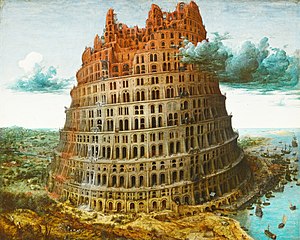January 17, 2021
 I’ve been spending a lot of time with Genesis 11:1–9 lately, or the story of Shinar and the so-called “Tower of Babel.” It’s a popular Sunday School lesson, an etiology we recount to children to explain why humanity is so varied in language and location. We don’t engage it as much when we get older. For that reason, how we read and are taught the story as children often stays with us well into adulthood.
I’ve been spending a lot of time with Genesis 11:1–9 lately, or the story of Shinar and the so-called “Tower of Babel.” It’s a popular Sunday School lesson, an etiology we recount to children to explain why humanity is so varied in language and location. We don’t engage it as much when we get older. For that reason, how we read and are taught the story as children often stays with us well into adulthood.
So, what are we taught about this story? We are taught that God is not pleased with what God sees when God pays the residents of Shinar a visit. Maybe the humans have grown too powerful and need to be humbled. Maybe God doesn’t like that they’re too uniform in thought and language. The solution to God’s displeasure is to — create diversity? If that’s the conclusion, what are we to believe about how God feels about human diversity? What happens when we are inadvertently taught that our diversity is a result of God’s displeasure and we never interrogate that lesson beyond childhood?
The truth is, Genesis 11 never tells us anything about what God is feeling about Shinar; we draw those conclusions ourselves. Maybe verse 6 doesn’t indicate worry on God’s part, rather that God is impressed with what humanity can do (“… nothing that they propose to do will now be impossible for them”). Maybe God wants to push them further, grow their capacity and see them rise to the occasion of a new challenge. Most good teachers don’t leave you where you are. They push you. They challenge you. They help you deepen your practice. Maybe humanity abandoned the lesson — and each other.
Scripture doesn’t say much about race because race as we know it is a relatively new invention. It is a social construct that assigns arbitrary meaning to human differences. God did not create race. God did create difference. How we feel about those differences influences how we read Scripture. Genesis 11:1–9 has been used to legitimate some of the most oppressive practices in human history, including settler colonialism, chattel slavery, apartheid and Jim Crow. If Shinar for us is proof of God’s displeasure with human unity, we are more likely to accept injustices like structural racism and de facto segregation. If we understand it as God’s call toward growth and relationships that don’t necessarily come easy for us, we won’t make the mistake of refusing to continue building together.
Rev. Denise Anderson; Coordinator of Racial and Intercultural Justice; Compassion, Peace & Justice; Presbyterian Mission Agency
Revised Common Lectionary Readings for Sunday, January 17, 2021, the Second Sunday in Ordinary Time (Year B)
First Reading 1 Samuel 3:1-10 (11-20)
Psalm 139:1-6, 13-18
Second Reading 1 Corinthians 6:12-20
Gospel John 1:43-51
Today’s Focus: Race Relations Day/Racial & Intercultural Justice
Let us join in prayer for:
PC(USA) Agencies’ Staff
Jeff and Christi Boyd, Presbyterian Mission Agency
Daniel Braden, Presbyterian Publishing Corporation
Let us pray:
Holy One, forgive us for abandoning your lessons and each other. Forgive us for perverting your gift of diversity by viewing it as something to exploit. Forgive us for imposing our will over yours. Forgive us for our tacit acceptance of injustice and our indifference toward our siblings in the margins. Forgive us for refusing to stay with each other when understanding became difficult. Forgive us for prioritizing our own comfort over an increased capacity to do even greater things. Help us to recommit ourselves to learning each other’s languages. Remind us of the power you have given us, and that the best way to reach the highest heights is with each other. Amen.